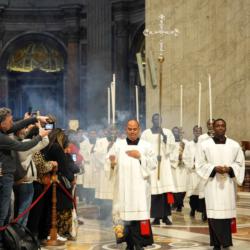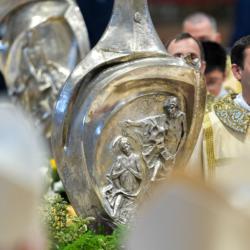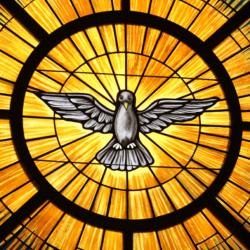British church steps up opposition to 'deeply flawed' assisted suicide bill
OXFORD, England (OSV News) -- The head of the Catholic Church in England and Wales has urged renewed opposition to a draft law on assisted suicide, amid signs the measure could now fail in the face of mounting criticism.
"As Catholics, we have maintained a principled objection to this change in law recognizing that every human life is sacred," Cardinal Vincent Nichols of Westminster said in a pastoral letter to be read in churches April 6.
"This measure is being rushed without proper scrutiny and without fundamental questions surrounding safeguards being answered. It is a deeply flawed Bill with untold unintended consequences."
The letter was published as British parliamentarians prepared for the bill's crucial third reading on April 25, following reports its implementation could now be delayed until 2029.
Cardinal Nichols said the church was opposed "in principle" to the much-contested bill, which elevated "the autonomy of the individual above all other considerations."
He added that parliamentarians had not been given time to consult or reflect on the "long and complex" measure, and he urged Catholics to write to their members of Parliament highlighting its "damaging consequences."
"We wish to remind you that it is a fundamental duty of every MP to ensure legislation is not imposed on our society which has not been properly scrutinized," said the cardinal, who chairs the English and Welsh bishops' conference.
"The time for debate was minimal. The committee examining the bill took only three days of evidence. … This is no way to legislate on such an important and morally complex issue."
The "Terminally Ill Adults (End of Life) Bill," tabled by Labour Party MP Kim Leadbeater, will allow physician-assisted suicide for the terminally ill over 18 years old with six months or less to live who evidence a "clear, settled and informed wish to end their own life," without "coercion or pressure."
The 34-page text, narrowly approved Nov. 29 by 330 votes to 275 in Britain's House of Commons, is personally supported by Prime Minister Keir Starmer but strongly opposed by his health and justice ministers.
Critics accused Leadbeater of packing a 23-member parliamentary committee, which ended scrutiny of the bill March 25, with pro-suicide MPs, while allowing little time for submissions by key experts and institutions.
A key safeguard, requiring all death applications to be approved by a high court judge, was scrapped March 12, fuelling speculation that more parliamentarians could now vote against it.
In a Feb. 4 speech, Cardinal Nichols accused Starmer's government of being “deeply irresponsible” over the assisted suicide bill, adding that no more than seven hours' debate had been allotted to the draft law, compared to 700 assigned to a bill against fox hunting in 2004.
Meanwhile, in a March 21 podcast, the church's lead bishop for life issues, Bishop John Sherrington of Westminster, said the bill generated "more questions than it answers," adding that it was "incomprehensible" to propose "ending a life because of suffering."
"Will health care professionals, many Catholic, be afforded the freedom of conscience not to participate in an assisted death?" Bishop Sherrington asked.
"If made law, would this grease the 'slippery slope' pulling other vulnerable groups into scope? Clearly this is something we have witnessed in other jurisdictions."
Speaking March 25, Health Secretary Wes Streeting said Leadbeater had been advised to delay implementation of any law until 2029, following civil service warnings it could overburden Britain's National Health Service.
The spokesperson for Right to Life UK, Catherine Robinson, told OSV News more parliamentarians were concluding the bill was "a disaster," adding that Leadbeater's committee had seemed intent on "ramming through legislation regardless of serious moral, legal and practical concerns."
She added that no protections had been provided for people with Down syndrome and eating disorders, and said end-of-life hospices had been refused the right to opt out of assisted suicide on their premises "under threat of having their funding withdrawn."
Meanwhile, another pro-lifer said over 300 amendments offering safeguards for the disabled and mentally ill had been rejected by Leadbeater's committee, adding that the bill would become a major political issue if delayed until parliamentary elections in 2029."Starmer's government was tacitly encouraging MPs to vote for it -- it's significant it's now backing off," Tim Dieppe, head of public policy for the ecumenical organization Christian Concern, told OSV News.
"The fact that a four-year implementation delay has been agreed shows the measure will be much more difficult and costly than its proponents expected."
If enacted, the bill would make Britain the ninth European country after Austria, Belgium, Germany, Luxembourg, the Netherlands, Portugal, Spain and Switzerland to allow assisted suicide, which is also legal in 11 of 50 U.S. states.
However, a pro-life commentary, reposted on the bishops' website, said at least 36 MPs who voted for the bill in November had refused to commit to backing it in the future, adding that the "dangerous law change" would be defeated if just 28 now switched sides.
In his pastoral letter, Cardinal Nichols said he was concerned the scope of the bill, if passed, would be widened, adding that "vital questions" remained over the role of the judiciary, protection from coercion and the NHS's capacity to cope without cuts elsewhere.In his OSV News interview, Dieppe said he hoped other churches would follow Cardinal Nichols in urging members to petition their MPs.
"There've been other past attempts to legalize assisted suicide, and people won't be discouraged from trying again if this one is voted down," the Christian Concern head told OSV News.
"We need strong voices like this to say this isn't morally right -- that we should value human life and not dismiss it, encouraging suicide abetted and assisted by the state."
- - -Jonathan Luxmoore writes for OSV News from Oxford, England.


















